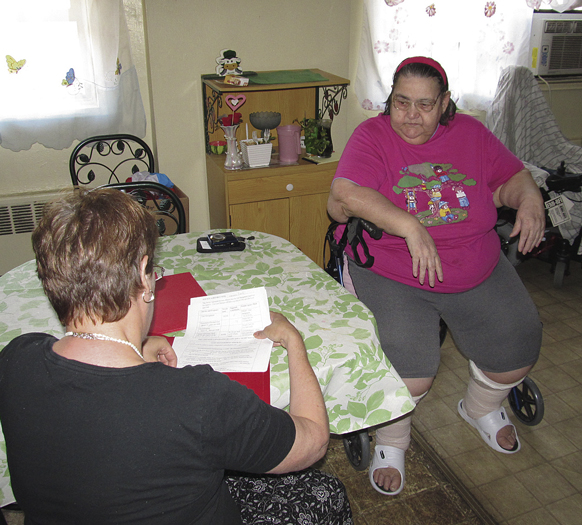
Aging is a process that affects everyone. For some, it can be gradual; for others, painful. But either way, it’s inevitable.
However, the process may look bleak for local seniors receiving in-home aid from Brooklyn-Queens Catholic Charities. The organization is calling for the full restoration of $6.6 million in N.Y.C. funding toward services for the homebound elderly.
The Council of Senior Centers & Services of N.Y.C., Inc. –a membership organization of more than 200 senior services in N.Y.C. of which Catholic Charities is a member — is asking the mayor and the city council to restore the funding. If not restored, Catholic Charities would not terminate any services but would be forced to increase the already saturated caseloads for many of its staff members based on the limited funding.
Services would potentially be cut 16.5%, in addition to the 16.5% cut that Catholic Charities experienced in July 2011. At that time, 90 case managers – 30% of all case managers in the city – were eliminated, forcing other case managers to add more clients.
Case managers find it difficult to spend adequate time with individual clients when resources are spread so thin. The standard caseload for each caseworker should be about 65 clients, but some case managers currently have over 90 clients and find they can only perform the bare minimum.
“These cuts will make it more difficult to provide our services effectively to the older adults that we serve,” said Barbara Kelly, L.M.S.W., director of Case Management Services for South West Queens Senior Services, one of 160 Catholic Charities programs in the diocese. “We are afraid these people will be put in danger.”
The South West Queens chapter is funded by the N.Y.C. Department for the Aging. Its mission is to provide services to older adults who are unable to leave their homes without assistance but choose to remain in their own homes.
To qualify for aid, a case manager visits a client to assess that person’s physical health, living accommodations and family situation. A care plan is developed, which can include in-home aid, Meals on Wheels or links to other resources. Case managers follow up with their clients to ensure they can remain safely at home.
At any one time, there are 900 clients receiving aid from South West Queens Senior Services and over 800 people receiving daily Meals on Wheels. Additionally, the waiting list is more than 100 people deep.
“If there are any more cuts, I don’t even know how any of these agencies can function,” said Carol Sirlin, social work supervisor for South West Queens Senior Services, who has worked for Catholic Charities the past 12 years. She has 35 clients while supervising four case managers, each of whom have 90 clients.
The average age of a client is 85 years old, with one of every five clients above age 90. Many do not have family in the area and thus rely on Catholic Charities to provide necessary healthcare services. However, caseworkers believe they would not be able to follow up effectively with their clients if the funding is cut.
For example, a 100-year-old Jamaica woman, who was cared for by her daughter, was recently found in grave condition and brought to the hospital. Her daughter had become ill and moved away, which was never reported to the client’s case manager. Since the case manager could not follow up as frequently because of the increased caseload, the woman had stopped eating, and there were rats in her apartment.
“The older adults who live at home and can’t get out easily without assistance are really hidden from view,” Kelly said. “They are invisible in our society, and they are among the most vulnerable.”
One of these clients is Connie Pierre, a 77-year-old homebound senior, who receives weekly Communion from St. Gerard Majella parish, Hollis. Her family lives in Colorado, so she was visited frequently by a nurse from the hospital. However, her insurance ran out, so she has relied on in-home aid three times weekly from Catholic Charities.
“If they took help away from me, I don’t know what I would do, but I would not go into a nursing home,” Pierre said emotionally. “I’d rather die than go into a nursing home.”
Kelly said that the Catholic Charities program is much more cost effective for the city rather than placing the homebound elderly on Medicaid or in nursing homes. She thinks it’s possible for a full restoration of the funding, since the City Council realizes that the program is a lifeline for its clients.
“It’s a moral obligation on all of us to take care of our elderly,” Kelly said. “We feel that the city owes them something to help them remain in their own homes as long as possible.”
A restoration of funds would allow Catholic Charities to rehire case managers – alleviating the workload on the current staff allowing the organization to focus on its mission of service.
“God bless Catholic Charities,” Pierre said. “Without them, I’m really stuck. I pray to God that I don’t lose this.”

One thought on “Threat to Seniors”
You must sign in to leave a comment.